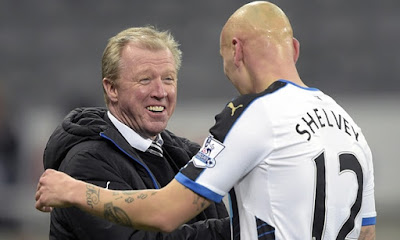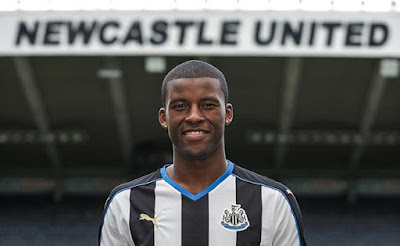Jonjo Shelvey is the first
England international Newcastle United have bought since Alan Smith in 2007.
Nine years since one of the world’s biggest clubs paid out for one of the
country’s best players.
Rob Lee once said that the
only way Roy Hodgson would come to St James’ Park would be if he were French.
Perhaps more criminally than Newcastle’s lack of domestic investment, Shelvey
is the first player deemed to be a direct replacement for a certain Yohan
Cabaye; a Frenchman who departed 2 years ago.
A player who can make
Newcastle tick, as demonstrated on a brilliant debut against West Ham,
Shelvey’s signing has been celebrated in the North East. Andros Townsend soon
followed last week in another big money deal, and £21 million is suddenly on
the table for Saido Berahino; a deal which would smash Michael Owen’s transfer
record from over a decade ago.
It is a far cry from the
questionable and incredibly frustrating transfer policy Newcastle have adopted
since Graham Carr’s cut-price capture of Cabaye in 2011. So why only now has
the club changed its stance?
Steve McClaren’s influence on
the newly formed board means targeting players with more Premier League
experience will be a regular occurrence. It is obvious that Shelvey and
Townsend were McClaren signings and that Henri Saivet, like Florian Thauvin
before him, was another arrival from Graham Carr’s French conveyor belt.
The club’s reluctance to shake
off their continental recruitment policy has heavily contributed to a slow
demise in the Premier League since finishing 5th in 2011/12. As far
as Mike Ashley’s approval of big money deals for England internationals goes,
it’s a green light driven by fear.
The Newcastle owner came out
of public hiding for a timely pre-match interview before the final day victory
over West Ham last season. A last-ditch throw of the dice from a man who
realised that an unthinkable relegation was firmly on the cards. A speech to
stir players and fans alike before a crucial game, Ashley promised a summer of
big signings and renewed ambition.
Indeed the signings of
Georginio Wijnaldum, Aleksandar Mitrovic, and Chancel Mbemba were impressive
and welcome, but a preference for a Thauvin over a Townsend had sections of
supporters questioning the additions Premier League know-how. Had Newcastle not
been sitting so perilously to the drop going into this transfer window, and had
been hovering around the top 8 as targeted, there is no doubt that the owner
would be reluctant to spend on the likes of Shelvey when he could wait until
the summer.
Financially for Ashley,
relegation would be disastrous. He knows that spending the money know is just a
mere fraction in comparison to the reward of next season’s TV money if the club
stay in the league. He fears the drop, so he is spending big to avoid it. The
club can claim ambition, a new approach, but in reality the owner doesn’t want to
lose a lucrative place in England’s top league.
Go back to the Championship
season of 2009/10. Newcastle were going well towards a return to the Premier
League going into the January transfer window. But with nothing near
guaranteed, Ashley made the signings that ensured the squad would get well over
the line. The “risk” of spending on transfers was worth it for Ashley. Not
getting promoted was simply not an option financially.
A 5th placed finish
and the Europa League would surely be enough for most clubs to recognise the
need to kick on and strengthen with acquisitions. Yet Ashley stood still and
needed to fast track a clutch of signings in the January of 2013 to shake up a
squad in freefall. Moussa Sissoko and Yoan Gouffran were supposed to be
post-season free transfers, and the club used that as an excuse to explain why
only a loan signing of Loic Remy was bank-rolled ahead of 2013/14.
Newcastle were going very well
indeed in January 2014 when Cabaye was sold to Paris St Germain. No danger of
the drop so no need to spend was the attitude, but the playing and coaching
staff imploded and finished meekly once again.
Signings were promised and
made as the club recognised that the lack of action in the wake of Cabaye’s
departure had threatened their future as a top flight side. Eventually paying
dividends, the club’s hierarchy failed to act in different sense in January
2015 as Alan Pardew walked out to take charge at Crystal Palace. Once again in
no apparent danger, John Carver was left in charge until the end of the season
and we all know how that went.
The point is this; if
Newcastle United are “safe” in the bosom of the Premier League table then the
hand will stay firmly in the pocket as quite frankly the target is met. The
club can dress it up as ambition and come out and make impassioned
declarations, but the actions are driven by fear of loss by a single-minded
owner.
In the current Premier League
climate, with vast amounts of money available to each and every club, the likes
of Leicester, Stoke City, West Ham, and Southampton have seized an opportunity
to kick on as aspiring football clubs. They have done things in the right way
in all departments, moved with the times. There has been no standing still but
genuine ambition to reach greater heights in a now very open Premier League.
A club of Newcastle United’s
magnitude should be right up there, but 21 points and 18th in the
league tells you how it really is.
Newcastle United’s image as a
“stepping stone” club for aspiring European internationals needs to be firmly
quashed. It has been a policy that has slowly diseased a club that is sinking
year on year closer to an inevitable drop. It is no coincidence that Newcastle
have struggled for goals when the burden has been placed on a 21 year old
Mitrovic, who has a potentially high sell on value in the next 5 years, rather
than a nailed on Premier League goal getter like 27 year old Charlie Austin.
An unwillingness to pay that
bit more for guaranteed, proven results and take risks on players that may or
(more often) may not pay off has ultimately now left Mike Ashley and Lee
Charnley needing to take risks the other way round. They seem to only learn
when mistake after mistake is made.
But with Newcastle only
serving to consistently lose games in the Premier League and stay firmly in the
relegation mire, too many mistakes may well have been made. There is no doubt,
with a minimum of 5 wins needed from the remaining 15 games, that Newcastle are
not showing enough to suggest they will definitely stay up this time.
Yes, Ashley may well be
bringing in impressive signings with a Premier League blueprint now, but it
could be too little too late for Newcastle United.

































